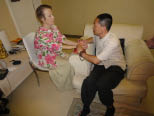| Dreamless Sleep and Bye Bye Beijing Belly -- The TCM Route to Senior Health
By staff reporter PAMELA LORD
|
 |
| The author with TCM practioner Li Haifeng. |
HAVING entered the penultimate of Shakespeare's seven ages of man, or in my case, woman, I find that hitting 60 and official old age sparks a general re-evaluation of what constitutes enjoyment and a sense of well-being. The saying you don't know what you've got till it's gone truly hits home with the realization that life without physical fitness is a weary, worrisome trudge. Consequently good health, along with gray hair in recession, deeply etched laughter lines and extra insulation around the vital organs, is a common preoccupation and topic of conversation among sexagenarians everywhere.
If I were in Britain I would be applying for my bus pass and other senior benefits, and likely to be on prescription medications. As an expat in Beijing, I am still employed and fit enough to cycle the hour each day, there and back, to my workplace. I feel fortunate on both counts.
I feel particularly thankful to the stars that led me, around ten years ago, to the same bicycle lane on Zhongguancun as my friend and TCM physician Li Haifeng. My warning to him to watch out for a looming bus led to an enduring friendship.
Li Haifeng came to Beijing as a soldier in the 1990s. On finishing his military service he studied at the Chinese Academy of Traditional Chinese Medicine and later under the tutelage of Dr Zhao Siyi.
He has soothed the Beijing Belly that besets me each spring, leaving me sleep-deprived, depleted and consequently unable to think straight, cured the dermatitis on my fingers and toes, and keeps me in good running order with a weekly tui na massage. People I have recommended him to include a French haircutter whose occupational arthritis he successfully treated, a French copy editor whose psoriasis he cured, and a Russian TV journalist whose nausea-inducing migraines he curtailed.
This article is not intended as an advertisement for Li Haifeng but to confirm through personal experience that TCM works, and recommend it as an alternative to the scorched-earth approach to healing of Western medicine.
TCM is a part of life in China. The Chinese use folk TCM remedies for minor ailments and include dried herbal medicines in their diet to ward off illness. While living in Daxing District in 1997, I once saw through the window of the community clinic a local resident, her face bristling with acupuncture needles as other patients waited to be seen. What seems from a Western vantage point to be exotic medical ministrations is the norm here in the East. Western medicine is also both available and popular. Li Haifeng regards it as a quick fix for people whose work schedules do not allow them the cumulative time, albeit a few days to a week, that TCM takes to work.
Li Haifeng is not anti-Western medicine. He acknowledges that there are certain conditions that require radical surgery and intensive antibiotics. The difference between him and, say, a family doctor in Europe or the U.S., lies in the time he takes to consider all factors of a specific health problem. This holistic approach ensures that either or both of the two aforementioned more aggressive forms of treatment are last resorts.
Like homeopathy, Ayurveda (Traditional Indian Medicine), and naturopathy, TCM takes a holistic approach to healing, in contrast to conventional medicine, which treats the symptoms of a complaint rather than going to its root.
TCM is an immensely complex system that hinges on the dualistic principle of Yin and Yang, which can also be interpreted as coolness and heat, applied to physical structure, organs, diagnosis, diseases, and to the remedies prescribed to heal them. TCM regards the body as a network of channels, or meridians through which qi – the life force – flows. Health problems result when these channels get blocked. This is where acupuncture comes in, as well as moxibustion (the burning of mugwort to facilitate healing), and herbal remedies. Needles strategically inserted into the body unblock the meridians and allow the qi to flow unimpeded.
| 